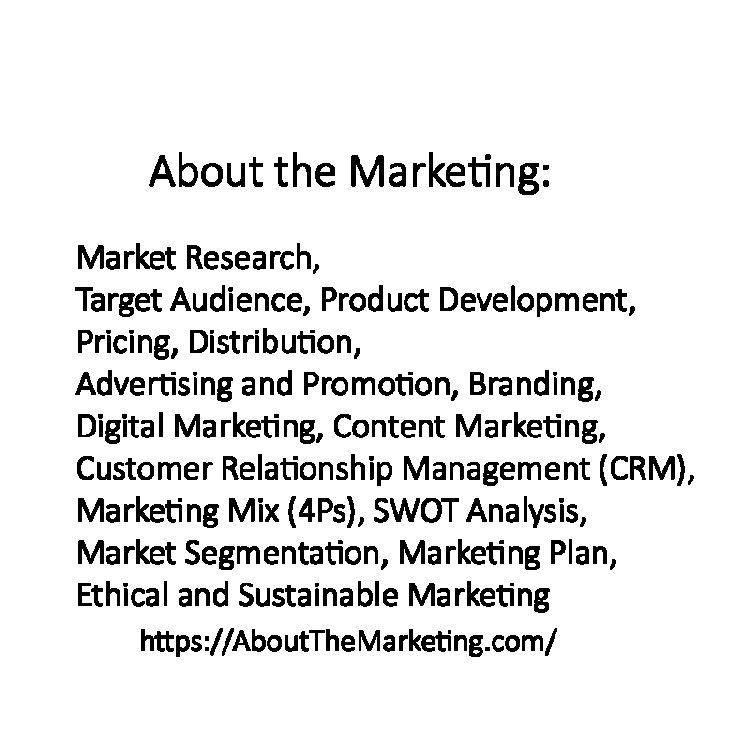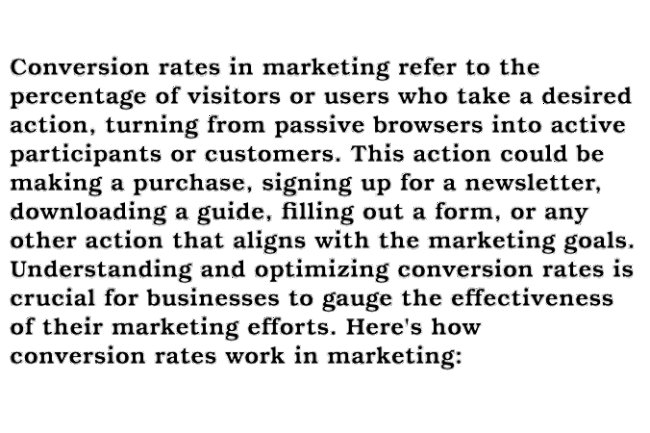About the Marketing
Marketing is a multifaceted business discipline that involves a set of activities and strategies aimed at promoting products, services, or ideas to target audiences in order to achieve specific business goals. It plays a critical role in the success of any organization and encompasses a wide range of activities, including market research, product development, pricing, distribution, advertising, and customer relationship management. Here are some key aspects and concepts related to marketing:

Marketing is a multifaceted business discipline that involves a set of activities and strategies aimed at promoting products, services, or ideas to target audiences in order to achieve specific business goals. It plays a critical role in the success of any organization and encompasses a wide range of activities, including market research, product development, pricing, distribution, advertising, and customer relationship management. Here are some key aspects and concepts related to marketing:
Market Research: Understanding your target market is essential. Market research involves gathering and analyzing data about consumer preferences, behaviors, and trends to identify opportunities and challenges in the market.
Target Audience: Defining a specific group of people or businesses that your product or service is intended for is crucial. Tailoring your marketing efforts to this audience helps maximize effectiveness.
Product Development: Creating products or services that meet the needs and desires of your target audience is a fundamental aspect of marketing. This includes product design, features, and quality.
Pricing: Determining the right price for your product or service is essential. Pricing strategies can vary, including premium pricing, value-based pricing, and competitive pricing.
Distribution: How and where your product is made available to customers is a key consideration. Distribution channels may include physical stores, e-commerce websites, wholesalers, and more.
Advertising and Promotion: These activities involve creating awareness about your product or service and persuading potential customers to buy it. Common advertising methods include TV commercials, online ads, social media marketing, and content marketing.
Branding: Building a strong brand identity helps differentiate your products or services from competitors. A well-defined brand can evoke trust and loyalty among customers.
Digital Marketing: With the rise of the internet and digital technologies, online marketing has become increasingly important. It includes strategies such as search engine optimization (SEO), social media marketing, email marketing, and pay-per-click advertising.
Content Marketing: Creating valuable, relevant, and consistent content to attract and engage your target audience is a key component of modern marketing. This can include blog posts, videos, infographics, and more.
Customer Relationship Management (CRM): Managing and nurturing relationships with customers is vital for long-term success. CRM systems help businesses track customer interactions and tailor marketing efforts accordingly.
Marketing Mix (4Ps): This classic marketing framework comprises Product, Price, Place, and Promotion. It serves as a foundation for developing marketing strategies.
SWOT Analysis: Evaluating a company's strengths, weaknesses, opportunities, and threats is a strategic tool used to assess the competitive landscape and make informed marketing decisions.
Market Segmentation: Dividing a market into distinct groups based on factors such as demographics, psychographics, or behavior helps marketers target their efforts more effectively.
Marketing Plan: A comprehensive marketing plan outlines an organization's marketing goals, strategies, and tactics. It serves as a roadmap for achieving marketing objectives.
Ethical and Sustainable Marketing: In today's socially conscious world, ethical and sustainable marketing practices are increasingly important. Businesses are expected to operate in ways that benefit society and the environment.
Marketing is a dynamic field that continually evolves to adapt to changes in consumer behavior, technology, and the competitive landscape. Successful marketing strategies require ongoing analysis, flexibility, and creativity to stay ahead in the marketplace.
What's Your Reaction?
















